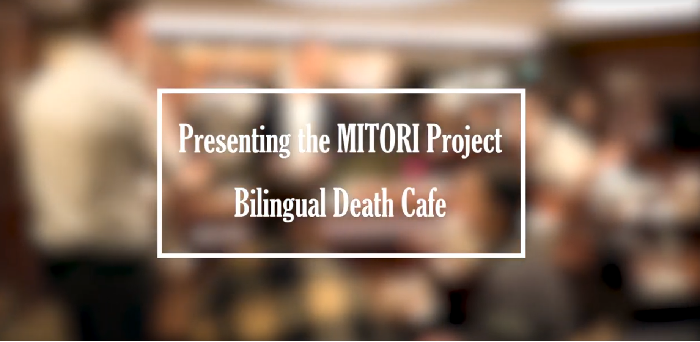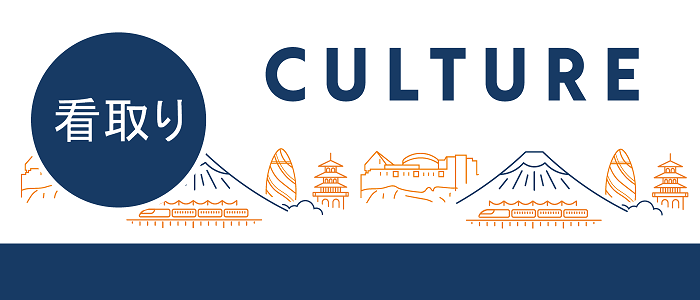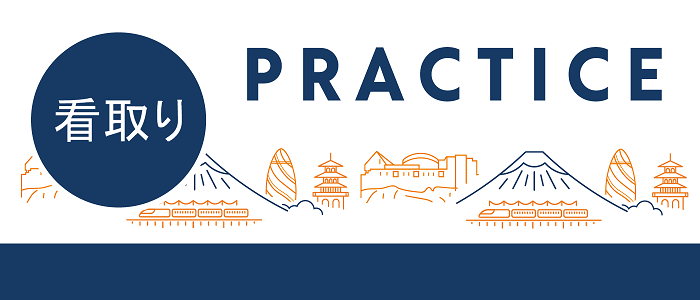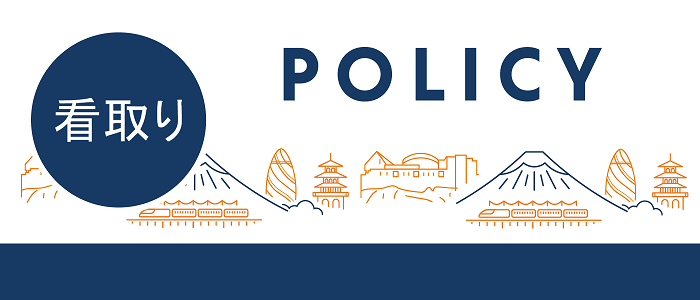
The Mitori Project | Overview
Film by Emma Dove and Amy McCreadie
Subtitles are available in both English and Japanese.
字幕は、画面右下の設定(歯車のマーク)ボタンで、オフにしたり、日本語・英語に切り替えることができます。携帯やタブレットでご視聴の場合は、画面右上の設定ボタン(点が縦に3つあるマーク)で切り替えることができます。
Subtitle Information
Film by Emma Dove and Amy McCreadie
Subtitles can be switched to Japanese or switched off entirely by clicking the settings button in the lower right corner of this video and choosing between English, Japanese or Off. If you are watching on a mobile or tablet, these settings can be found by clicking the three vertical dots in the top right corner of this video. Thank you.
字幕は、画面右下の設定(歯車のマーク)ボタンで、オフにしたり、日本語・英語に切り替えることができます。携帯やタブレットでご視聴の場合は、画面右上の設定ボタン(点が縦に3つあるマーク)で切り替えることができます。
Our sincere thanks to Joshua Gallagher and Chao Fang for their help and support with translation and interpretation.
End of life care in the United Kingdom and Japan - intersections in culture, practice and policy
ESRC-AHRC UK-Japan SSH Connections Grants Call Specification
We are grateful to the Economic and Social Research Council, grant number ES/S013865/1 for funding under its UK-Japan Social Science and Humanities Connections scheme. This project will run from January 2019 to September 2020.
The Economic and Social Research Council (ESRC) and the Arts and Humanities Research Council (AHRC) have made available this award to the University of Glasgow as part of the UK-Japan Social Sciences, Arts and Humanities Connections grants, aimed at fostering the development of long-term relationships with Japanese researchers in the fields of social sciences, arts and humanities (SSH).
We are grateful to Tetsuya Kishimoto, First Secretary (Health, Labour and Welfare) at the Embassy of Japan in the UK for his interest and support for the work we are undertaking.
Our Aim
Our aim with Mitori is to forge a new research agenda for end of life care in the two countries, with a team that can take it forward, based on mutual learning and a comparative approach. Our project brings together academics using the perspectives of social science, the humanities, and ethics to examine how care of people at the end of life is currently organised in the UK and Japan. We explore how this has been shaped by relevant cultural, demographic, professional and policy factors. Our focus is on how two societies with ageing populations, heavy demand on health and social care systems and changing social expectations about dying, death and bereavement, are responding to the challenges they face.
Objectives
1. To identify key thematic areas of difference and commonality in end of life issues relating to Japan and the United Kingdom, through three work streams focused on: culture, practice and policy, and paying special attention to the conceptual problems of comparison, providing us with the knowledge to shape a new agenda for social science research on end of life care in the two countries.
2. To facilitate face to face meetings between the participants and also develop an active online and digital forum for the sharing of ideas and the development of collaborative work between team members, enabling us to build capacity for future working.
3. To create an outward facing presence through a website and the active use of social media platforms, thereby building a wider community of interest around the project and establishing robust pathways to impact, helping us to identify key stakeholders to engage as users and co-producers of future research.
Research Questions
Given the nature of our project, our questions are part methodological, and part substantive. They are also closely tied to our stated objectives.
- How do methods, disciplinary perspectives, priority topics and the grouping and organisation of end of life research reflect shared or divergent approaches in the UK and Japan?
- Which areas of end of scholarship and research are most and least developed in the two countries?
- What are the most significant areas (e.g. hospice/palliative care; bereavement; responses to disasters; trajectories of dying; assisted dying) in which a comparative approach between Japanese and UK researchers can develop new insights and approaches?
We are convinced that the questions we pose can only be answered through a multi-disciplinary lens. Our team therefore comprises perspectives from sociology, anthropology, philosophy and ethics, and religious studies. We make use of conceptual frameworks from post-colonial and translation studies, science and technology studies, theories of globalisation and development, feminism and death studies.
Core Team and Collaborators
Our team comprises perspectives from sociology, anthropology, philosophy and ethics, and religious studies. We make use of conceptual frameworks from post-colonial and translation studies, science and technology studies, theories of globalisation and development, feminism and death studies.
We have assembled a core team of eight people, equally divided between the UK and Japan to be responsible for the key tasks of the project and the outputs. Lead by Professor David Clark and Professor Hirobumi Takenouchi, six Early Career Researchers (ECRs) working in pairs (Japan/UK) have taken the lead on the three themes (Culture, Practice and Policy). In addition, we have recruited a group of collaborators from the UK and Japan who will offer advice and commentary on the work.
The core members of the Mitori team are: David Clark, Hirobumi Takenouchi, Gitte Koksvik, Yoshinori Takata, Marian Krawczyk, Haruka Hikasa, Chao Fang, Miho Tanaka, Joshua Gallagher, Amy McCreadie, Akiko Nishio, and Yurika Seki.
Administration and Project Support
University of Glasgow; Amy McCreadie
Shizuoka University; Yurika Seki
For more information, please contact endoflifestudies@glasgow.ac.uk
Publications
(2020) The Mitori project: End of life care in the United Kingdom and Japan – intersections in culture, practice and policy, Progress in Palliative Care, 28:3, 189-191, DOI: 10.1080/09699260.2020.1748814
March 2020
Chao Fang & Miho Tanaka (2020) Mitori Project Policy Brief - March 2020
September 2019
Chao Fang (2019) Reflections on The Mitori Project so far. Glasgow End of Life Studies Group Blog
April 2019
David Clark (2019) End of life issues in Japan and the UK: the Mitori Project blossoms. Glasgow End of Life Studies Group Blog
February 2019
David Clark (2019) The Mitori Project – keeping a ‘watching brief’ on end of life issues in Japan and the UK. Glasgow End of Life Studies Group Blog
The Mitori Project - Workshop 1 | Dumfries, Scotland
Film by Emma Dove and Amy McCreadie
The Mitori Project - Workshop 2 | Shizuoka, Japan
Film by Emma Dove and Amy McCreadie
Subtitles
Films by Emma Dove and Amy McCreadie
Subtitles can be switched to Japanese or switched off entirely by clicking the settings button in the lower right corner of this video and choosing between English, Japanese or Off. If you are watching on a mobile or tablet, these settings can be found by clicking the three vertical dots in the top right corner of this video. Thank you.
字幕は、画面右下の設定(歯車のマーク)ボタンで、オフにしたり、日本語・英語に切り替えることができます。携帯やタブレットでご視聴の場合は、画面右上の設定ボタン(点が縦に3つあるマーク)で切り替えることができます。
Related items on our blog
The Mitori Project
Professor David Clark introduces The Mitori Project, ahead of the first Full Team Workshop in Dumfries, March 2019

Shizuoka University Television
Further Reading
Borgstrom, E and Walter, T. (2015) “Choice and compassion at the end of life: A critical analysis of recent English policy discourse”. Social Science & Medicine, 136-13: 95-105.
Cherny, N. (2012) “Controversies in oncologist-patient communication: a nuanced approach to autonomy, culture and paternalism.” Oncology 26(1): 37-41.
Clark, D., Inbadas, H., Colburn, B., Forrest, C., Richards, N., Whitelaw, S., Zaman, S. (2017) “Interventions at the end of life – a taxonomy for ‘overlapping consensus’” Wellcome Open Research; 2: 7.
Fukui, S. Yoshiuchi, K., Fujita, J., Sawai, M., Watanabe, M. (2011) “Japanese people’s preference for place of end-of-life care and death: a population-based nationwide survey”. Journal of Pain Symptom Management 42(6):882-92.
Geertz, C. (1994) “Thick description: Toward an interpretive theory of culture”. In M.Martin & L. C. McIntyre (Eds.), Readings in the philosophy of social science (pp. 213-231). Cambridge, MA: MIT Press.
Hirayama, Y Otani, T Matsushima, M. (2017) “Japanese citizens’ attitude toward end-of-life care and advance directives: A qualitative study for members of medical cooperatives”. Journal of General and Family Medicine (18)6; 378-385
Koksvik, G. (2018) “Medically Timed Death as an Enactment of Good Death: An Ethnographic Study of Three European Intensive Care Units”. 2018. OMEGA- Journal of death and dying pp. 1-14
Koksvik, G. (2015) “Dignity in Practice: Day-to-Day Life in Intensive Care Units in Western Europe”. Medical Anthropology 34(6), pp. 517-532
Krawczyk, M. and Richards, N. (2018) “The relevance of ‘total pain’ in palliative care practice and policy”. European Journal of Palliative Care, 25(3), pp. 128-130.
Locke, M. (1996) “Death in Technological Time: Locating the End of Meaningful Life”. Medical Anthropology Quarterly, New Series, 10,4: 575-600.
Long, S O. (2005) Final Days. Japanese culture and choice at the end of life. Hawaii: University of Hawaii Press.
Lynch, T., Connor, S., and Clark, D. (2013) “Mapping levels of palliative care development: a global update. Journal of Pain and Symptom Management” 45(6): 1094-1106. (
Makino, J. et al. (2014) “End-of-life considerations in the ICU in Japan: ethical and legal perspectives” J. Intensive Care.
Odachi, R., Tamaki, T., Ito, M., Okita, T., Kitamura, Y., Sobue, T. (2017) “Nurses’ Experiences of End-of-life Care in Long-term Care Hospitals in Japan: Balancing Improving the Quality of Life and Sustaining the Lives of Patients Dying at Hospitals” Asian Nursing research11: 207-215
Orpett Long, S. 2001. Negotiating the “Good Death”: Japanese Ambivalence about New Ways to Die. Ethnology, 40,4: 271-289.
Quality of Death Report. (2015) “Quality of Death Index: Ranking Palliative care across the World”. Economist Intelligence Unit, London, UK.
Richards, N. (2017) “Assisted suicide as a remedy for suffering? The end-of-life preferences of British ‘suicide tourists’”. Medical Anthropology, 36(4), pp. 348-362. (doi:10.1080/01459740.2016.1255610) (PMID:27845576)
Scranton, R. (2015) “Learning to Die in the Anthropocene”. San Francisco: City Lights.
Steffen, EM. & Klass, D. (2018) “Culture, contexts and connections: a conversation with Dennis Klass about his life and work as a bereavement scholar”, p. 208. Mortality, 23:3, 203-214.
Suh, S-Y., Morita, T., Oyama, Y., Chiu, T-Y., Koh, S. J., Hwang, S-J., Yoshie, T., Tsuneto, S. (2015) “A Cross-Cultural Study on Behaviors When Death Is Approaching in East Asian Countries. What Are the Physician-Perceived Common Beliefs and Practices?” Medicine 94 (39) 2-6.
Takenouchi, H. (2007) “Mitori no biunka no saikouchiku he mukete [Towards reconstruction of “cultures of” “mitori” in modern Japanese society]”. Shimizu, T (eds) Koureishakai wo ikiru: iruhito/Mitoru shisutemu[Living in aged society: Growing old/Caring for the dying], Toshindo Publishing, pp.95-116.
Takenouchi, H. (2015) “Where does Environmental Crisis Lead Us? : Towards Construction of Environmental Bioethics”. 4th International Conference on Management and Economics, University of Ruhuna, Sri Lanka, pp.1-15.
Valentine, C. (2009) “Continuing bonds after bereavement: a cross-cultural perspective” Bereavement Care 28:2, 6-11; Valentine, C (2013) “Identity and post-mortem relationships in the narratives of British and Japanese mourners” The Sociological Review 61: 2:383-401.
Vijay D, Zaman S and Clark D. (2018) Translation of a community palliative care intervention: Experience from West Bengal, India [version 1; referees: 2 approved, 1 approved with reservations]. Wellcome Open Res, 3:66
Walter, T. (2017) What Death Means Now: Thinking Critically About Dying and Grieving Bristol. Bristol: Policy Press.
Zaman, S., Inbadas, H., Whitelaw, A. and Clark, D. (2017) “Common or multiple futures for end of life care around the world? Ideas from the ‘waiting room of history’”. Social Science and Medicine, 172, pp. 72-79.




